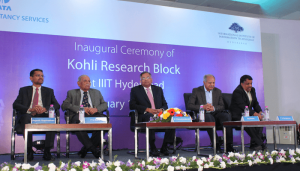What do aspiring Computer Science students, Hyderabad-based deep tech startups and industries with a focus on AI and ML have in common? Well, they all seek the same address: The International Institute of Information Technology Hyderabad (IIITH), Gachibowli, Hyderabad. With all the buzz on revolutionary technologies, we try to learn more about the largest AI magnet and umbrella housing all the intelligent systems on campus – the FC Kohli Centre on Intelligent Systems. Read on.
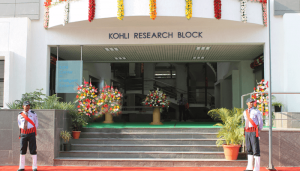
When IIITH (incidentally the first IIIT of its kind) was originally founded in 1998, the intention was to make a difference in the sphere of IT education in general and research in particular. With its innovative and unique curriculum that facilitates interdisciplinary research, the focus was on applied research that found real uses in industry and society as well. Over the years, with industry collaborations and world class research being churned out in its research centres, it has emerged as an AI force to reckon with. Despite being one of the youngest tech-based institutions in India, IIITH has been ranked as the leading institute in India for Artificial Intelligence and Robotics over the period 2008-2018, as per CSRankings.org. As the AI, ML, robotics and other disciplines such as biometrics, natural language processing, data mining, autonomous navigation, grew significantly in research capabilities, a pressing need was felt to physically cluster them together and augment the infrastructure accordingly.
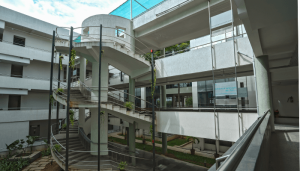
A Single Destination
Terming the AI cluster of research centres housed at IIITH as “intelligent systems”, 2015 saw the unveiling of the TCS Foundation-sponsored FC Kohli Center on Intelligent Systems in Himalaya Block B. Named after the ‘Father of the Indian Software Industry’ and the founder and first CEO of TCS, the center with 60,000 sqft of built up area marks a unique partnership with TCS. The aim of the collaboration is primarily two-fold: One, as an umbrella entity, to strengthen existing research groups on campus. Two, to facilitate new activities in related areas, such as attracting projects and funding from other government entities, industry sector or academic institutions. Home to one of India’s largest academic incubators, IIITH attracts promising deep tech startups that can transform academic research to benefit the society at large. Hence apart from imparting high quality training and conducting high impact research in the areas of intelligent systems, the center is also responsible for promoting entrepreneurship in the same areas.
The center is led and steered by an advisory board consisting of Turing Award winner Dr. Raj Reddy, an early Pioneer in Artificial Intelligence and University Professor at Carnegie Mellon University (CMU); Dr F.C. Kohli, Dr. Manuela M. Veloso, Herbert A. Simon University Professor, School of Computer Science, Carnegie Mellon University, USA; and Dr. Mark S. Fox, Director, Center for Social Services Engineering, Department of Mechanical and Industrial Engineering, University of Toronto, Canada.
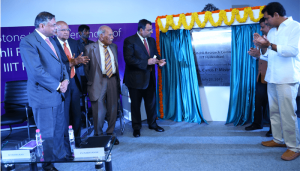
Spotlight on Research Centres
Here’s a brief look at the research labs that are fostered under the Kohli Center:
Centre for Visual Information and Technology (CVIT):
Headed by Prof. C V Jawahar, who is also the Dean of Research and Development, this center deals with the generation, processing, and understanding of primarily visual data as well as techniques and tools required for doing so efficiently. The activity of this center overlaps the traditional areas of Computer Vision, Image Processing, Computer Graphics, Pattern Recognition and Machine Learning. CVIT works on both theoretical as well as practical aspects of visual information processing. It is involved with a number of research projects funded by various agencies like- Department of Science and Technology(DST), Naval Research Board (NRB), Ministry of Communications and Information Technology(MCIT), Defence Research and Development Organisation(DRDO), General Electric(GE), Nvidia among others. Students from this centre have been creating waves at the last prestigious Conference on Computer Vision and Pattern Recognition (CVPR 2018) by bagging the Best Runner-Up Paper Award as well as the Honourable Mention Award for research papers presented there. Among some of the projects that have garnered recent media attention is the project on digitizing heritage information at the Golkonda Fort, and a pilot project on badminton analytics that went live on Star Sports during the Premier Badminton League 2019.
This lab conducts research in an interdisciplinary area that involves Philosophy, Psychology, Neuroscience, Linguistics, Anthropology and Artificial Intelligence. Researchers from this lab are currently working on problems such as developing assistive tools for children with learning difficulties such as dyslexia, autism and others. They are also working on understanding and modelling of visual metaphors, aesthetics and its applications to layout and interface design and so on. Technology developed in the realm of serious gaming, useful for neuro-rehabilitation of stroke-striken patients has been transferred to a startup incubated at the Centre for Innovation and Entrepreneurship (CIE). In more recent news, a paper on “Desktop VR is better than Non-ambulatory HMD VR for spatial learning” was selected as one of the best papers at the renowned EURO VR 2017 conference and has been published in Frontiers in Robotics and AI.
Data Sciences and Analytics Centre
This centre conducts research, facilitates technology transfer, and builds systems in the broad area of data engineering. Data engineering in turn encompasses modeling, storage and management, processing, dissemination, search, recommendation, and autonomous processing of structured and semi-structured (multimedia) data. Some recent research conducted here includes data mining application for natural language processing tasks, product evaluation through customer-review analysis, computing the extent of diversity for a frequent pattern, medical document analysis and so on.
Language Technologies Research Centre (LTRC)
This centre in turn houses four other labs:
- MT-NLP Lab: Machine Translation and Natural Language Processing Lab where the focus is on understanding and developing computational theories of human language. With NLP/Computational Linguistics expected to play a major role in facilitating man-machine communication as well as man-man communication, such theories allow us to understand the structure of language and build computer software that can process language.
- Anusaarka Lab:This is where traditional Indian shastras and advanced modern technologies come together. Anusaaraka is a machine translation tool developed jointly by the Chinmaya International Foundation (CIF), IIITH and University of Hyderabad’s Department of Sanskrit Studies.
- Speech Processing Lab:In this lab, fundamental issues involved in building robust speech-to-text systems, natural sounding text-to-speech systems, spoken/audio information retrieval and biometrics using speech and video are addressed.
- Information Retrieval and Extraction Lab:In the pursuit of solving real-world problems affecting us today, this lab has been instrumental in the creation of tools such as fake news detector (Fake-o-Meter), multi-document summarizer, an automatic Tweet generator and so on.
With its focus on Mobile and Aerial Robotics, Robotic Vision, Mechanism Design and Multi Robotic Systems, this lab is well equipped with robot platforms and advanced sensors and has been publishing and making its presence felt at top international conferences like the International Conference on Intelligent Robots and Systems, the Conference on Robotics and Automation among others. It collaborates with well known organizations such as Qualcomm as well as other research labs such as Centre for AI and Robotics, Bangalore, Bhabha Atomic Research Centre and so on.
Machine Learning Lab
Teaching machines to learn from environments so that they can take decisions independently – that’s machine learning in short for you. In this lab, the focus is on the role of deep learning in planning, reinforcement learning as well as game theory. The success of an industry partnership here has been most visible with the victory of the IIITH-TCS team named VidyutVanika in the PowerTAC 2018 competition – a competitive simulation of future retail electric power markets, in which the competitors are retail “brokers” who buy and sell power in both wholesale and retail markets. More recently at the prestigious conference on Autonomous Agents and Multi Agent Systems, a slew of papers related to blockchain technology and sponsored search auctions were presented by researchers from this lab.
Social And Human Applications For AI (SAHAAI)
The youngest to be a part of the KCIS group is the SAHAAI centre headed by Prof. Nimmi Rangaswamy. With its focus on AI and its impact on society, SAHAAI has been working on assessing the social impact of automation in the IT job sector, specifically training its lens on areas where data sciences intersect with social sciences such as social interactions in virtual reality, analysing political behaviors on online social media and so on.
Summer Schools, Workshops, Talks and Competitions
Due to increasing interest in deep neural networks, high speed computing and the visibility afforded by KCIS, the institute has seen a steady climb in the demand for research in AI and ML. Incidentally the demands are not just from aspiring students but from working professionals too. To cater to these demands, the centre has been offering short term courses and conducting summer schools in these areas on a regular basis. The summer schools on Computer Vision, Machine Learning and Natural Language Processing coupled with conferences and workshops on AI are highly sought after by relevant stakeholders. KCIS also regularly conducts the Distinguished Lecture Series where eminent speakers are invited to address and talk about AI-related topics. Some of the speakers who have addressed the series in the past are Prof. Anil Jain, a leading expert in the field of pattern recognition, computer vision and biometrics from Michigan State University, Prof. Andrew Zisserman, one of the principal architects of modern computer vision from the University of Oxford, Prof. Manoj Saxena, Executive Chairman of Cognitive Scale, Prof. Richard Socher, currently Chief Scientist at SalesForce but more popularly known as one of the best Deep-NLP teachers at Stanford, and others.
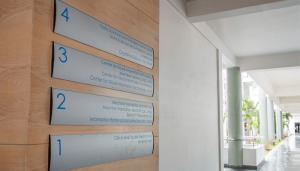
Outreach
The centre’s outreach has been outstanding with engagements not limited to academic institutions, but also in terms of technology and product licensing, research engagements with other industries, and executive education. The foundation stone was laid for this TCS-funded centre four years ago in July 2015. “KCIS has come a long way since then with about 30 faculty members and over 250 research scholars,” says Prof. P J Narayanan, the Director of IIITH, while thanking the TCS Foundation for all their efforts.
